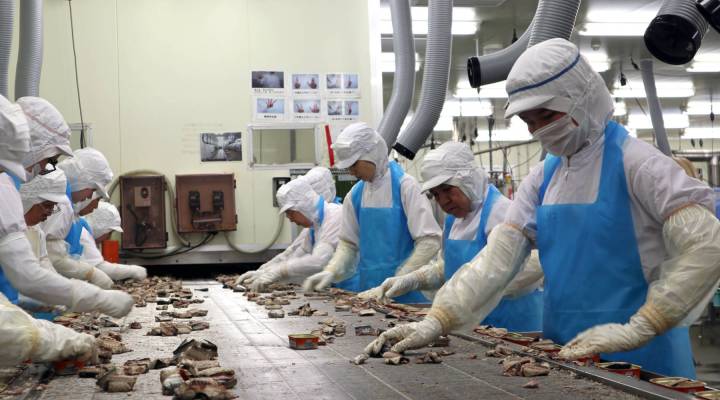
Japan expands use of foreign "interns" to address labor shortage
Japan expands use of foreign "interns" to address labor shortage

Inside Tsuda Shoten — a fish processing plant in Kamaishi, Japan — large machines whir and clang, connected by networks of chutes and rollers that shuttle tons of fish around the building. While much of the work is automated, many tasks still need human hands. That’s where workers like Nguyen Ti Thanh, 26, come in.
On a recent summer afternoon, she’s standing near a conveyor belt as a batch of silvery mackerel stream by. One at a time, she grabs a fish, and with a pair of scissors, clips off the tail and fins. Originally from Vietnam, Thanh has worked at the company for about two years.
Thanh is one of about 250,000 workers participating in what’s known as Japan’s Technical Intern Training Program. Officially, its purpose is to bring in folks from neighboring countries and teach them skills that they can apply when they return home after they’ve fulfilled their 3-5 year work contracts.
Asked why she came all the way to Japan for the job, she responded in rudimentary Japanese: “I’d heard Japan is a wonderful country, so I wanted to experience it.”

Trinh Thi Thanh (left), 21, and Nguyen Ti Thanh, 26, are interns at Tsuda Shoten, a fish processing company in Kamaishi. Originally from Vietnam, they are two out of the approximately 250,000 workers who are in Japan because of the country’s Technical Intern Training Program.
Although it’s billed as “technical training,” critics, academics, and even some government officials say that that diplomatic framing is merely a cover for its true purpose — to bring non-Japanese workers into a country where talk of immigration is political dynamite.
The shortage of willing and qualified workers is a familiar lament among businesses in the U.S., where the unemployment rate is around 3.7 percent. But the labor market in Japan, with its unemployment rate at 2.4 percent, is under extraordinary pressure due to a combination of a declining birth rate, a rapidly aging population (about 27 percent of people in Japan are over 60-years-old), and a general wariness of foreigners and immigrants. For every 100 job seekers, there are 160 job openings (in the U.S. there are around 110 job openings for every 100 job seekers).
As such, “interns” like Thanh — most of which hale from countries such as Vietnam, China, the Philippines, Indonesia, and Thailand — aren’t your summer-break-coffee-getting variety. They are full-time employees who are helping to plug worker shortages in a variety of Japanese industries including manufacturing, hospitality, agriculture, construction, textiles, and food processing.
For Yasuyuki Tsuda, who runs the fish processing company, Japanese workers have been difficult to find.
“If we put out a job ad, nobody’s going to respond,” he said. So, Tsuda began hiring interns, which today make up roughly 10 percent of his factory staff, he said.

Yasuyuki Tsuda, who owns a fish processing company in Kamaishi, Japan began hiring foreign interns after having trouble finding enough Japanese workers. His business is one of more than 35,000 that employ interns.
Since the government established the intern program in the early 1990s, it has continuously grown. Currently, over 35,000 businesses use it, according to the Organization for Technical Intern Training (OTIT), a government-funded agency set up last year to oversee the program.
“It’s a warped way of trying to get laborers to come to Japan,” said Ippei Torii, a labor activist who runs a nonprofit in Tokyo called the Solidarity Network with Migrants Japan.
“The system itself is structurally wrong,” Torii said.
First, Torii said, interns are contractually bound to employers for periods as long as 3 to 5 years, and they are almost never allowed to switch jobs. Moreover, many interns have gone into debt in order to join the program, or have paid large deposits to brokering agencies in their home countries which would be forfeited if they left their jobs. Taken together, these factors prevent workers from leaving internships, even when they are abused, underpaid, or overworked. Add to that a lack of adequate regulation, and you have what he describes as a form of indentured servitude.
Every few days, Torii says his office gets texts or calls from interns with complaints ranging from wage theft and harsh working conditions, to physical abuse at the hands of employers. He wants to see the program abolished, because, he said, this is not a case of a few bad apples.
There is some data to support that assertion. A 2016 investigation of over a thousand companies that host interns found 70 percent of them in violation of some labor or safety law, according to Japan’s Ministry of Health, Labour and Welfare.
“My impression is that those who are critical of the program … tend to exaggerate the problems,” said Kazuyuki Kinbara, executive director at OTIT, the program’s main regulator. Serious violations are rare, he said. And when abuses do occur, it is the mission of his newly created agency to weed them out, he said.
While some observers question whether oversight from OTIT, with little more than 300 staffers and a mandate to perform onsite inspections of participating employers just once every three years, can prevent illegal practices, Kinbara said, “We’re doing our best.”
He added, nobody is forcing people to Japan as interns. “It’s supply and demand,” he said.

Nguyen Ba Cong, 34, came to Japan expecting to work in concrete construction. Instead, he says he was put to work doing radiation cleanup at various sites that were affected by the 2011 meltdown at the Fukushima nuclear plant meltdown.
Indeed, many interns willingly pay a small fortune to brokers in their home countries to help them get a spot in the program. In the past several years, the number of foreign interns working in Japan has grown more than 75 percent (from 143,308 in 2011 to 251,721 in 2017, according to data from Japan’s Ministry of Justice).
Nguyen Ba Cong, 34, who came here from Vietnam a couple of years ago, said he paid the equivalent of over $8,000 for a chance to make good money in concrete construction.
But soon, Cong and other interns were tasked with doing radiation cleanup at sites affected by the 2011 meltdown at the Fukushima nuclear plant, he said. At the time, he said his employer never explained to them what they were doing.

“I had to work, work, work,” said Nguyen Thi Tuyet Mai, 37, who said that as an intern at a garment factory in Japan, she was forced to work 14 hours per day.
“Had we known it was related to radioactive stuff, we would never have done it,” Cong said.
Nguyen Thi Tuyet Mai, 37, said she signed on to intern at a garment factory with hopes of earning money for her two children, the working conditions gradually became unbearable. For about two years, she said, she was forced to work 14-hour days assembling clothes for brands such as Theory, a U.S. fashion label that is owned by a Japanese parent company. (Theory did not respond to multiple requests for comment for this story.) She said her salary was between 120,000 to 130,000 yen per month — the equivalent of about $1,000 to $1,100 in American dollars.
“I had to work, work, work,” she said. “In a year, I was only given one week off.”
Earlier this year, Tuyet Mai and Cong left their internships and sought refuge at a shelter for displaced interns in Koriyama. Despite their troubles, both say they want to stay and find new internships because the money they can earn in Japan will be better than it would be back home. Unlike some critics of the program, they don’t want to see the program abolished.
And neither does the Japanese government. Currently, lawmakers are considering doubling the length of time that interns can stay, from a maximum of five years to 10 years.
There’s a lot happening in the world. Through it all, Marketplace is here for you.
You rely on Marketplace to break down the world’s events and tell you how it affects you in a fact-based, approachable way. We rely on your financial support to keep making that possible.
Your donation today powers the independent journalism that you rely on. For just $5/month, you can help sustain Marketplace so we can keep reporting on the things that matter to you.


















